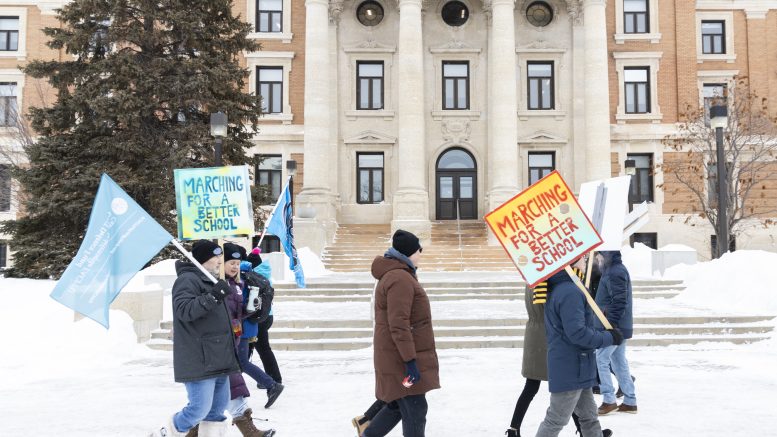The University of Manitoba Faculty Association (UMFA) held a rally on Jan. 23 in front of the university’s Administration Building amid ongoing contract negotiations.
The collective agreement between UMFA and the university expired on April 1, 2024, and despite making progress on new contract negotiations, UMFA president Erik Thomson expressed that the administration “has reached the end of the rope” on certain issues.
UMFA is the certified bargaining agent for approximately 1,200 full-time academic staff at the U of M, established in 1951. The primary objectives of the association include promoting the interests of teachers, researchers and librarians at the university, advancing professional standards and enhancing the quality of higher education in Canada, according to their website.
Thomson indicated that UMFA has been in active negotiations over a new contract with the university’s administration since October 2024, but that “there are some monetary and workplace issues” that have yet to be rectified.
“We had a negotiating session on Friday where they presented a new monetary offer, and so the rally on Thursday was to demonstrate that we needed a little bit more from the board of governors — who has the authorization to make those monetary offers,” said Thomson.
Since the rally, the university has proposed adjustments to salary caps, including an $8,000 increase for full professors, $2,000 for associate professors and $1,000 for assistant professors, said Thomson.
As part of the resolution to the 2021 strike — which lasted 35 days — Thomson stated that the university’s administration expressed the goal to get the U of M to the 25th percentile in salary amongst the 15 leading research universities across Canada (U15).
“Essentially, they have made a salary offer that by the end of the contract would get us to the current 25th percentile,” he said. “We are at the bottom of the U15 in salary currently, and for certain ranks like our full professors, the top of our rank […] is below the starting rank of other U15 institutions.”
Thomson stated that he is not expecting UMFA members to be compensated like the University of British Columbia or the University of Toronto, “which clearly offer a lot more but also [have] very much higher costs of living.” However, he referenced other universities such as Dalhousie University and the University of Calgary which he stated are much more ahead of the U of M.
“We’re not looking to be where the 25th percentile would be now in four years, but actually get a lift up so we’re always maybe a little bit ahead of the bottom,” said Thomson. “And we think that’s important so that we can recruit good faculty in all areas and make sure that the faculty that are here are receiving appropriate compensation.”
Thomson also expressed that “there really hasn’t been any action” on the childcare agreement of UMFA members in the collective agreement which has been there since 1991, he stated. “We’re looking for a little bit more commitment to actually [live] up to the promises that the university has made.”
Article 29 of the expired collective agreement states that “the university is committed to the goal of ensuring quality childcare for the children of members.”
“We had a couple of proposals that tried to get some spaces opened up,” said Thomson. “There’s a new childcare centre being built up at Health Sciences and there’s a childcare centre on Fort Garry, and there’s all sorts of resistance to opening up for childcare for faculty members.”
Thomson acknowledged that inadequate childcare can hurt recruitment efforts for those that don’t have family in Winnipeg or a history here. “Having childcare close […] is often a real relief. Childcare is hard to get in Winnipeg,” said Thomson.
UMFA is now exploring additional ways to pressure the administration, though specific strategies have not been finalized. “We’ll have to see what our members want,” said Thomson.


